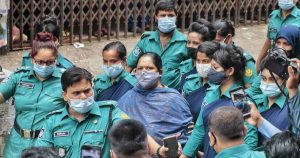M ZAHIDUL HAQUE
ONCE I asked an English-speaking Journalist who used to work in a reputed Middle-East country newspaper—“How much press freedom do you enjoy? Do you face any restriction while publishing news and views?” Well, he said-“there is no such restriction but I was told that it’s me who would decide how much freedom I am supposed to enjoy”. Actually this statement points to the principle of responsible journalism. Press Freedom is based on the foundation of people’s right to freedom of expression and communication through the Press which includes both print and electronic media. The Americans enjoy a wide volume of freedom of the press under the Fifth Amendment of their Constitution which states—“Congress shall make no law……abridging the freedom of speech or of the press”.
In a democratic society, informative and transparent Press establishes a result-oriented connection between the people and the government. In some countries, freedom of the press is being controlled by powerful authorities and elites of the society. Often it becomes increasingly difficult on the part of a journalist to project truth with objectivity.
It is equally true that sometimes press freedom over-empowers the people causing chaos and anarchy in the society which widens the gap between informed decision and disinformation.
However, the negative sides of the media are not alone the product of press freedom but the outcome of other societal differences.
Currently, the World is passing through a serious crisis due to the invasion of coronavirus causing COVID-19 disease. In this corona era, the media is enjoying a wide range of freedom wherein both professional journalists and citizen journalists (through social media) are exploring facts and figures about COVID-19 some of which are contributing to the generation of misinformation.
Coronavirus has also given birth to a number of debates, such as, “did China engineered the novel coronavirus and spread it from their Lab?’ On the other hand, The American President is claiming that China is responsible for spreading the coronavirus”. About COVID-19 treatment options, the media has also circulated some misinformation, for example, the efficacy of Hydroxychloroquine! The UN Secretary-General Antonio Guterres has rightly observed—“As the (COVID-19) pandemic spreads, it has also given rise to a second pandemic of misinformation, from harmful health advice to wild conspiracy theories. The press provides the antidote: verified, scientific, fact-based news and analysis”.
Of course in the current world, certain segments of journalism, such as, investigative journalism, climatic journalism, etc. have flourished significantly. During this corona era, the press enjoying much freedom in Bangladesh has successfully brought the episode of relief rice stealing to the limelight through investigative reporting. Unfortunately, however, some media reports on this issue have caused unjust sufferings to some innocent people who never involved themselves in such ill practice.
There is one popular principle of journalism, i.e. objective reporting. Once a postgraduate student of mine (I was the course teacher in agricultural journalism) asked me whether such a thing called ‘objective reporting’ really exist. There is, I replied—“Hadn’t there been objective reporting, how could the art of journalism survive till today?” In objective reporting, a journalist presents event and issues in a neutral and unbiased manner, regardless of his/her opinion or reservation. I trust that majority of the journalists in our country and elsewhere maintains firm determination to portray the events objectively without any biases. But often due to unexplained and unexpected influence they are compelled to get away from the objectivity because, for them, journalism is not a passion but occupation, their bread earner!
In my opinion, those who aspire to take up journalism as their profession should keep it in mind that s/he is the lone crusader to projecting truth, absolute truth. And the fellow-journalist should carry forward the unfinished mission of his/her colleague who had fallen victim to misfortune and could not complete his/her assignment. Here I would like to pay rich tributes to all those brave journalists who sacrificed their lives for their noble profession—journalism!
The World Press Freedom Day is observed every year on May 3 appreciating the role of the Press as a medium of communication between the government and the people and for shaping the peoples’ opinion for the greater good. The theme of this year’s World Press Freedom Day is- “Journalism without Fear or Favor” and sub-theme—“Safety of Women and Men Journalists and Media Workers”.
While wishing a grand success of the World Press Freedom Day 2020, we sincerely hope that soon the Corona era would be over and we would be again free to pursuing objective journalism in a COVID-19 free World!
(The author is a Professor in the Department of Agricultural Extension and Information System at Sher-e-Bangla Agricultural University, Dhaka)




